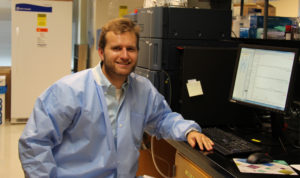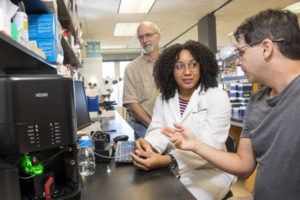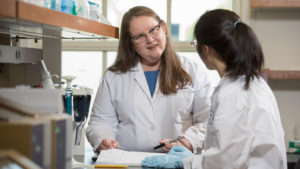Training Fellowships

On this page
- T32 Training Grant
- TIPS Fellowship
- PREP Program
- NSF REU Summer Program
The Center for Tropical and Emerging Global Diseases provides a number of fellowship opportunities to its trainees to further their research.

NIH-funded Pre-doctoral and Postdoctoral Positions Available in Interdisciplinary Parasitology, Vector Biology, and Emerging Diseases
The Center for Tropical and Emerging Global Diseases (CTEGD) within UGA is home to perhaps the largest number of parasitology research laboratories in the US that collectively cover the full gamut of parasitic diseases. Every year protozoan and helminth parasitic diseases of humans are responsible for more than a million deaths, many millions more cases of severe morbidity, and hundreds of millions of cases of subtle morbidity due to chronic infections. The Training in Tropical and Emerging Global Diseases program at the University of Georgia (UGA) trains graduate students and postdoctoral scholars to become independent research scientists who study parasitic diseases in the context of global health. The research program seeks fundamental insights into protozoan and helminth parasites and their interaction with their mammalian hosts and invertebrate vectors. It combines cutting-edge bench and field science with perspectives on the global challenges and opportunities for the control and elimination of parasitic diseases. These perspectives are grounded in firsthand experience by trainers and collaborators around the world. The CTEGD is uniquely positioned as a training ground for the next generation of parasitology/tropical disease researchers and the breadth and culture of this program instill trainees with the ability to translate basic scientific findings into tool development and the implementation of interventions, and foster their ability to identify and formulate a fundamental research question out of the context of parasitic disease itself.
Candidates for positions on this NIH-funded training grant must be citizens or permanent residents of the United States. Inquiries should be directed to Dr. Silvia Moreno, T32 Director.
The competition for the two postdoctoral position on the CTEGD T32 NIH Training Grant occurs each May and applications are done in conjunction with one of the faculty members of the CTEGD. Therefore, interested candidates should contact the faculty member with whom they would like to pursue postdoctoral training and then, in consultation with the faculty member, the candidate should develop an application that will be evaluated by the CTEGD Training Grants Committee. The application needs to include the following items:
- Your complete CV
- A letter from you describing your interest in CTEGD and your future plans
- A letter from your proposed CTEGD mentor
- 2 letters of reference
- The deadline for submission of an application is in March of each year, with the actual date being posted on our website several weeks in advance of the due date.
It is suggested that those interested in applying should visit faculty profiles, and then contact the PI or PIs with whom you have the most interest in working, and pursue the possibilities based on your interests and their options.
- You must be a US citizen or permanent resident
- Salary for the postdoctoral position is determined by the salary scale published by the NIH each year for such positions (information for 2017).
- As with all training grant positions, this is a one year award with the possibility of a second year based on performance and training grant contingencies.
- Since this is a NIH/NRSA training grant, there is a pay-back requirement involved, and a completed Payback Agreement (PHS Form 6031) needs to be submitted for each postdoctoral trainee. This form and a discussion of the pay-back provisions can be found here. This payback is often satisfied by continued research employment following one’s training period.
- While postdoctoral scholars on the CTEGD Training Grant will receive most of their training through their specific research projects with their mentors, being on the T32 Training Grant does carry with it some participatory obligations within CTEGD. As outlined in the original grant application, these are:
- Regular participation in the CTEGD RIP seminar series
- Participation in the CTEGD Research Ethics Seminar or an equivalent participation in another suitable series on responsible research practices
- Auditing the Global Perspectives in Tropical and Emerging Infectious Diseases course.
At the end of the first year on the Training Grant, and prior to leaving the program, should that be at a later time, postdoctoral trainees will prepare a progress report containing a self-evaluation and present it to their mentor. Within two weeks the mentor will review it, make additional comments as needed, sign and returned it to the trainee. The trainee will then present the progress report to the Program Director for discussion. The progress report will be evaluated by the Program Director and considered by the CTEGD Training Grant Committee if an additional year’s funding is requested. This process is designed to assist you and the Training Grant Committee in monitoring progress and offering assistance when deemed potentially useful.
The competition for the five predoctoral positions on the CTEGD T32 Training Grant occurs each May and applications are done in conjunction with your faculty advisor. Interested graduate students should be at least in their 2nd year of study when applying.
Eligibility:
- To be eligible trainees must be US citizens or Permanent Residents.
- Candidates must be working in a CTEGD laboratory.
- All trainees must be willing to participate regularly in CTEGD activities, such as Research in Progress sessions and Annual Symposium.
- Predoctoral trainees must take the courses Global Perspectives in Tropical and Emerging Infectious Diseases (MIBO/PBHL/IDIS/BHSI 8260) and Biology of Parasitism (CBIO 8500).
- All trainees must be trained in the responsible conduct of research (courses available are GRSC 8550, VETM 8550, CBIO 8080 or Gene 8650).
- If possible, predoctoral trainees must be willing to participate in a “Capstone Experience”, and show interest in continuing their research training in an area of parasitology. They should intend to continue in this field.
Application Process
Application material should be submitted as a single PDF.
- A cover letter from the applicant highlighting career goals and her/his willingness to comply with the above stipulations. Please, include an explanation of how the T32 fellowship would contribute to achieving career goals. (1-2 pages).
- A biosketch following the NIH format highlighting education (dates, locations, GPAs), research experience, presentations, publications, and sources/amounts/dates of assistantships or fellowships. Predocs may include grad level courses taken and grades earned. (2 pages)
- A research proposal of 2 pages (single-spaced) in length plus bibliography.
- Mentors should submit a nomination letter, a training plan for the candidate and a list of current support available for the candidate’s project. A biosketch is acceptable as long as it includes the available funding for the student’s project.
- Candidates who apply from outside CTEGD to join the laboratory of a CTEGD member should include, in addition to the materials described above, two additional letters of recommendations.
CTEGD T32 Training Grant: “Training in Tropical and Emerging Global Diseases”
Instructions for Trainee Applications
DEADLINE MAY 25th, 2020
Graduate students working in CTEGD T32 Training laboratories are invited to apply for a fellowship of the program “Training in Tropical and Emerging Global Diseases”
Potential candidates should be working in a CTEGD/T32 training laboratory and their research should focus on research areas of high interest to the CTEGD.
ELIGIBILITY, REQUIREMENTS and EXPECTATIONS of T32-trainees:
- To be eligible trainees must be US citizens or Permanent Residents.
- Pre-doctoral candidates must be working in a CTEGD laboratory that is funded by the NIH or other federal agency. The proposed project should focus in areas of high priority to the training grant: diseases caused by parasites.
- All trainees (and mentors) must be willing to participate regularly in CTEGD activities, such as Special Seminars, Research in Progress and the CTEGD Annual Symposium. In addition, trainees are expected to interact with special invited seminar speakers, and also to participate actively in graduate recruitment events.
- Pre-doctoral trainees must take the courses Global Perspectives in Tropical and Emerging Infectious Diseases (MIBO/PBHL/IDIS/BHSI 8260) and Biology of Parasitism (CBIO 8500).
- All trainees must be trained in the responsible conduct of research (courses available are GRSC 8550, VETM 8550, CBIO 8080 or Gene 8650).
- If possible, pre-doctoral trainees must be willing to participate in a “Capstone Experience”, and show interest in continuing their research training in an area of parasitology. They should intend to continue in this field.
- Trainees must participate in seminars and discussions of Rigor and Reproducibility or other Professional Development Activities organized by the CTEGD
MATERIALS TO BE SUBMITTED BY APPLICANT:
- A cover letter from the applicant highlighting career goals and her/his willingness to comply with the above stipulations.
- A biosketch following the NIH format (forms and examples attached) including a personal statement, contributions to science, scholastic performance, awards, etc. Use the attached bios as examples.
- A research proposal 2 pages (single-spaced) in length plus bibliography. Project should include a title and the sections: Introduction, specific aims and experimental plan including preliminary findings if available.
MATERIALS TO BE SUBMITTED BY MENTOR:
- A nomination letter addressing
-
- Student’s aptitude and motivation for research.
- Student’s likelihood of successfully completing program.
- Student’s progress toward completing project and working independently.
- Student’s projected completion date.
- Training plan for the candidate addressing the individual opportunities and needs of the trainee to achieve career goals. This could be part of the nomination letter.
- List of current support available for the candidate’s project. A biosketch is acceptable as long as it includes the available funding for the student’s project.
All materials of new applicants should be compiled into one pdf (following the order of the requests) and submitted to Silvia Moreno smoreno@uga.edu) WITH THE APPLICANT’S NAME IN THE SUBJECT LINE.
Mark R. Brown, Professor, Department of Entomology
Characterize the structure and function of peptide hormones and their receptors that activate key reproductive processes in two mosquito species: the yellow fever mosquito, Aedes aegypti, and the African malaria mosquito, Anopheles gambiae.
M. Belen Cassera, Associate Professor, Department of Biochemistry & Molecular Biology
Functional metabolomics applied to eukaryotic pathogens and antimalarial drug discovery from natural products and synthetic sources.
Donald Champagne, Associate Professor, Department of Entomology
Vector biology; salivary factors, particularly polypeptides, which facilitate blood feeding by inhibiting hemostatic defenses in vertebrate hosts.
Roberto Docampo, Barbara & Sanford Orkin/GRA Eminent Scholar in Tropical and Emerging Global Diseases; Professor, Department of Cellular Biology
Metabolic pathways of trypanosomatids and malaria parasites.
R. Drew Etheridge, Assistant Professor, Department of Cellular Biology
The Host-Parasite Interface; Identification and characterization of Toxoplasma gondii parasite effectors used to manipulate host cellular processes.
Vanessa Ezenwa, Professor, Odum School of Ecology and Department of Infectious Diseases
Effects of host behavior on parasitism and the role of parasites in the evolution of host behavior
Donald Harn, Professor and GRA Distinguished Investigators, Department of Infectious Diseases
Identification of cell receptors and signaling pathways that drive anti-inflammatory activation of antigen presenting cells; development of vaccines and therapeutics for HIV-1 and schistosomiasis.
Diego Huet, Assistant Professor, Department of Pharmaceutical and Biomedical Sciences
Metabolomics and CRISPR-based approaches to understand the mitochondrial and organellar biology of a class of protozoan parasites, the apicomplexans.
Chet Joyner, Assistant Professor, Center for Vaccines and Immunology
Immunology and Pathogenesis of Acute and Relapsing Plasmodium Infections
Jessica Kissinger, Professor, Department of Genetics; Director, Institute of Bioinformatics
Comparative genomic approaches to address issues relevant to the evolution and biology of the Apicomplexa. Big data and data integration for the solution of biological and host-pathogen interaction research questions.
Samarchith Kurup, Assistant Professor, Department of Cellular Biology
Malaria immunology
Dennis Kyle, Director, CTEGD; GRA Eminent Scholar in Antiparastic Drug Discovery; Professor, Departments of Cellular Biology and Infectious Diseases
Drug discovery and mechanisms of resistance; malaria and “brain-eating” amoebae.
Kojo Mensa-Wilmot, Professor and Department Head, Department of Cellular Biology
Chemical Biology, Biochemistry, and molecular biology of Trypansoma brucei. Discovery of signaling pathways regulating essential processes in the parasite.
Silvia Moreno, Professor, Department of Cellular Biology
Biochemical studies of Toxoplasma gondii: identification of differences in Ca2+ metabolism and function between the host cell and the parasite.
Vasant Muralidharan, Assistant Professor, Department of Cellular Biology
Cells in infection and immunity, Cell structure and function.
David Peterson, Associate Professor, Department of Infectious Diseases
Role of Plasmodium adhesion proteins in pathogenesis of placental malaria.
Shannon Quinn, Assistant Professor, Department of Computer Science
Distributed computing, deep learning, computer vision and bioimaging, biosurveillance, and public health informatics.
Robert Sabatini, Associate Professor, Department of Biochemistry & Molecular Biology
Antigenic variation in African trypanosomes.
Mike Strand, Regents Professor, Department of Entomology
Parasite-host interactions with emphasis on the study of parasitic wasps (parasitoids), insect development, and immunity.
Rick Tarleton, UGA Athletic Association Distinguished Professor in Biological Sciences, Department of Cellular Biology
Mechanisms of immunity and disease in Trypanosoma cruzi infections.
Christopher West, Professor and Department Head, Department of Biochemistry & Molecular Biology
The evolution and function of parasite glycosyltransferases, utilizing biochemistry in conjunction with gene editing and glycomic profiling to elucidate enzymatic and cellular roles.
| Name | Laboratory Trained In | Research Topic | Current Position |
|---|---|---|---|
| Aparna Telang | Brown | Effects of starvation on metamorphosis of mosquitoes | Assistant Professor, University of South Florida |
| Carla Black | Colley | Immunology of human schistosomiasis | Epidemiologist, CDC |
| Douglas Pace | Moreno | Aquaporins of Toxoplasma gondii | Assistant Professor, California State University – Long Beach |
| John Harrington | Hajduk | Mechansism of human innate immunity to African trypanosomes | Senior Scientist, Boehringer Ingelheim Animal Health |
| Matthew Collins | Tarleton | Regulation of CD8+T cells in peripheral tissues during T. cruzi infection | Associate Professor, Emory University School of Medicine |
| Charles Rosenberg | Tarleton | Role of immunodominant T cells in control of T. cruzi infection | |
| Tiffany Weinkopff | Lammie | Effect of filarial products on lymphatic endothelium | Assistant Professor, University of Arkansas for Medical Sciences |
| Sharon Keller | Moreno | Phospholipase C of Trypanosoma brucei | Assistant Professor, Georgia Gwinnett College |
| Ashley Hartley | Tarleton | Generation of attenuated parasites as experimental vaccines against Chagas disease | Assistant Professor, University of Tennessee |
| Jenna Oberstaller | Kissinger | Protozoan parasites of the Apicomplexan phylum | Postdoctoral Fellow, University of South Florida |
| Sarah Reiff | Striepen | Maintenance and replication of the apicoplast genome in Toxoplasma | Data Curator, Harvard University |
| Eldin Talundzic | Peterson | Exploring and characterizing DBL domain of the P. falciparum var2csa gene | Molecular Biologist, CDC |
| Michael Cipriano | Striepen | Early diverging Eukaryote Giardia lambia | In training |
| Hilary Danz | Harn | Impact of helminth infection on influenza mediated disease pathology | Virology Research Scientist, Sanofi Pasteur |
| Briana Flaherty | Peterson | Exposure to Plasmodium falciparum modifies the function of human trophoblast | Scientist, BioFire Diagnostics |
| Angela Pack | Tarleton | CD8+T cell responses during the chronic phase of T. cruzi infection | Post-doc, University of Iowa |
| Whitney Bullard | Sabatini | Epigenetic regulation in kinetoplastids | Scientist, Arcturus Therapeutics |
| Ciara McKnight | Moreno | Signaling cascades in T. gondii | |
| Phil Yao | Tarleton | A transmission-blocking vaccine for Trypansoma cruzi | Anesthesiology, UC San Diego Medical Center |
| Heather Bishop Kudyba | Muralidharan | The role of ER chaperones in the asexual and sexual development of the human malaria parasite, P. falciparum. | Post-doc, NIH/NIAID |
| Tony Szempruch | Hajduk | Mitochondrial RNA biology, mechanisms of protein diversity and how these Trypanosoma brucei alter host cells resulting in disease pathology | Senior Scientist, Pfizer |
| A. J. Stasic | Moreno | The characterization of the Vacuolar H+-ATPase (V-H+-ATPase) and its role in the lytic cycle of the Toxoplasma gondii parasite | Staff scientist, FDA |
| Mattie Pawlowic | Striepen | To describe the biochemical pathways utilized for oocyst synthesis, determine how different components contribute to environmental resiliency, and to pinpoint potential weak points in the oocyst structure. | Assistant Professor, University of Dundee |
| Msano Mandalasi | West | The role of prolyl hydroxylation and glycosylation of E3 Ubiquitin ligase on Toxoplasma growth | Research Professional, UGA |
| Catherine Morffy Smith | Moore | The role of syncytiotrophoblastic autophagy in the pathogenesis of placental malaria | |
| Ruby Harrison | Strand/Brown | The role of the mosquito microbiome in deterring pathogen infection | In training |
| Manuel Fierro | Muralidharan | Understanding how calcium is regulated in the endoplasmic reticulum of Plasmodium falciparum | Post-doc, Iowa State University |
| Molly Bunkofse | Tarleton | The host CD8+ T cell response that is generated against flagellar proteins from the parasite Trypansoma cruzi | In training |
| Karla Marquez-Noqueras | Moreno | Calcium signaling in Toxoplasma gondii | In training |
| Evgeniy Potapenko | Docampo | To characterize how the IP3R function modulated within the Trypanosoma brucei | Research Scientist, University of Wisconsin-Madison School of Medicine and Public Health |
| David Cobb | Muralidharan | Genetic and Chemical Approaches Reveal Function and Druggability of Chaperones in the Human Malaria Parasite Plasmodium falciparum | |
| Stephen Vella | Moreno | The role of host cell Ca2+ involved in parasite egress and how Ca2+ oscillations are decoded into different types of parasite motility. | In training |
| Alona Botnar | Kyle | In training | |
| Josh Butler | Cassera | Antimalarial natural products as tools to discover novel drug targets in the malaria parasite Plasmodium falciparum. | In training |
| Edwin Pierre Louis | Etheridge | Elucidating how the protozoan pathogen Toxoplasma gondii is able to use secreted protein effectors to manipulate its host cells functions. | In training |
| Logan Crowe | Docampo | In training | |
| Nathan Chasen | Etheridge | In training | |
| Melissa Sleda | Moreno | Characterization of enzymes of the isoprenoid biosynthetic pathway in Toxoplasma gondii | In training |
| Alona Botnar | Kyle | Drug-induced dormancy in Plasmodium | In training |
| Emma Troth | Kyle | Structure-based drug design to develop novel drug targets against N. fowleri | In training |
| Alejandra Villegas | Muralidharan | In training | |
| Megna Tiwari | Huet | In training | |
| Mojtaba Fazli | Quinn | In training |

CTEGD Training Innovations in Parasitologic Studies (TIPS) Fellowships
The CTEGD TIPS Fellowship program is funded by CTEGD and the Daniel G. Colley Training in Parasitology Fund to provide international research training opportunities for graduate students and postdoctoral trainees associates with CTEGD laboratories, and research training opportunities at UGA for advanced international trainees associates with CTEGD overseas research programs. Awarded through a competitive process, UGA TIPS Fellows are expected to pursue research in international laboratories for periods of approximately 6 weeks to 3 months, and likewise international TIPS Fellows should come to UGA to study in CTEGD laboratories for similar periods of time.
The applicant must submit an application (not more than 2 pages in length) that they have written, with the assistance of their mentor, and this application should address the following issues:
- The nature of the overall project of which this training is a part
- The research that will be done during the training period requested
- The time and location of the proposed training
- The reason why this training should be done in this location
- How the requested training will further the goals of the applicant
- A proposed budget
- The source of the funding that will support the actual research of the proposed training.
The applicant must also indicate their agreement to submit a written report of their training within 30 days of their return, and if they are a USA-based applicant to submit a presentation or poster abstract to the CTEGD annual symposium the year following their training.
The applicant must also include a letter of support (1 page should be sufficient) from the trainee’s direct mentor (either a CTEGD faculty member or the overseas PI collaborator of a CTEGD faculty member). This letter should address the quality of the applicant and the application, and how this research experience will contribute to the applicant’s research training.
The application must also include a letter of support (1 page should be sufficient) from the proposed mentor at the site of the proposed training (either a CTEGD laboratory or a CTEGD collaborating laboratory overseas). This letter must indicate a willingness to accept the applicant in the laboratory for a specified period of time, assurance that there are sufficient research funds available within the host laboratory, and a willingness to provide assistance to the applicant in arranging local living situations, as well as guidance and mentoring during the research at the proposed site of training.
Applications will be evaluated three times per year. Applications must be submitted to the Director of CTEGD by 5 pm US EST/EDT on the following deadline dates to be considered for awards that will be initiated 2 – 3 months following the deadline dates. If the deadline date falls on a weekend or UGA holiday, applications are due by 5:00 pm US EST/EDT on the next workday.
Deadline Dates:
- April 1
- August 1
- December 1
A CTEGD subcommittee comprised of the CTEGD Director and two CTEGD faculty members selected for each evaluation session by the CTEGD Director will evaluate the applications. The CTEGD Director will not select a CTEGD faculty member who is sponsoring an application for that evaluation session. If the CTEGD Director is sponsoring one or more applicants he will not participate in the evaluations of the applications that involve his laboratory and he will appoint a third CTEGD faculty member to fill in for him on that review session.
A USA-based applicant must be a member of a CTEGD faculty member’s laboratory and have been in the laboratory long enough for the faculty member to vouch for, and therefore sponsor, their application. An overseas applicant must be a member of a laboratory that actively collaborates with a CTEGD faculty member, and have the full support of the Principle Investigator of that collaborating laboratory as well as the PI of the laboratory in which they wish to participate.

Post-baccalaureate Training in Infectious Diseases Research (PREP)
PREP@UGA provides focused research training opportunities for students from underrepresented backgrounds. In this NIH-funded program, mentors work closely with recent post-baccalaureate students to provide them with the skills necessary to excel in biomedical graduate training programs. The goal is to equip those with the desire and motivation to become the next generation of biomedical researchers with the credentials required to achieve this. For more information and application procedure, visit PREP@UGA.

NSF-sponsored Research Experience for Undergraduates (REU) Summer Program
The Department of Microbiology administers the Research in Prokaryotic Biology REU. They provide an intensive, 9 week hands-on laboratory research program for 10 undergraduates in the summer. Exciting projects will address diverse topics in Prokaryotic Biology. CTEGD faculty involved in this program include Drs. Rick Tarleton, and Silvia Moreno. For more information on this program, visit the Department of Microbiology’s REU website.
